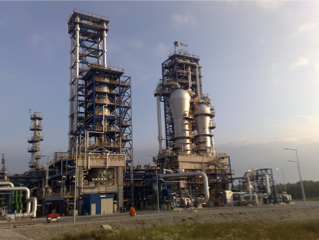
Project 1 - Optimal transitions
Optimal transitions studied two similar applications:  grade transitions during continuous manufacturing of polyethylene and start-up and shutdown of combination power plants. The common denominator was modeling and optimization of dynamical systems, which was achieved using the software Modelica and JModelica.org.
grade transitions during continuous manufacturing of polyethylene and start-up and shutdown of combination power plants. The common denominator was modeling and optimization of dynamical systems, which was achieved using the software Modelica and JModelica.org.
The first phase of the project, optimal grade changes, developed tools for model calibration to dynamic process data. The tools were then generalized for application in the second phase – start-up and shutdown of combination power plants.
 grade transitions during continuous manufacturing of polyethylene and start-up and shutdown of combination power plants. The common denominator was modeling and optimization of dynamical systems, which was achieved using the software Modelica and JModelica.org.
grade transitions during continuous manufacturing of polyethylene and start-up and shutdown of combination power plants. The common denominator was modeling and optimization of dynamical systems, which was achieved using the software Modelica and JModelica.org.The first phase of the project, optimal grade changes, developed tools for model calibration to dynamic process data. The tools were then generalized for application in the second phase – start-up and shutdown of combination power plants.
The project ended in 2013 but the research continued in ProOpt.
Phase 1: Optimal grade changes
The project was based on the trend within chemical process industry of increased product diversification and tailoring of products to customer needs. Typically, generic processes are used to produce several product grades and transitions between grades are performed during continuous operation. Increasingly competitive and volatile markets drive the need for flexibility in production systems.
PICLU researchers in collaboration with plastics manufacturer Borealis developed a model-based methodology for planning and evaluation of grade changes. The approach is based on high-level model descriptions in the form of Modelica models to formulate model calibration problems as well as optimal control problems. The open source platform JModelica.in was launched in 2012.
Phase 2: Start-up of combination power plants
Renewable power sources such as sun and wind constitute an increasing portion of the energy mix in Europe. But what about cloudy days and periods with low wind? Complimentary power sources are needed to fill the gap in supply. One such power source is combination power plant, which are normally fueled by natural gas. They need to be started and stopped with short notice and knowledge is needed of the most efficient mode of conducting these operations as well as when it is profitable to do so.
In this phase of the project the companies Siemens and Modelon joined the PICLU centre. Siemens run power plants and already had advanced Modelica models of their process, while Modelon delivers software. The project used the methods developed during Phase 1 for fitting of model parameters to dynamic process data, and also included a Master Thesis project on Model Predictive Control.